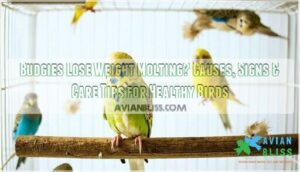This site is supported by our readers. We may earn a commission, at no cost to you, if you purchase through links.

This natural process typically causes a temporary 5-10% weight reduction over 4-6 weeks. You’ll notice increased feather debris, pin feathers emerging, and your bird appearing slightly scruffy or patchy.
During molting, budgies often eat less and sleep more while their metabolism works overtime producing keratin for fresh plumage. The weight loss isn’t cause for panic—it’s your bird’s way of prioritizing feather renewal.
However, dramatic weight drops or prolonged molting periods signal potential health issues requiring attention. Understanding the difference between normal molting changes and concerning symptoms helps you provide proper support during this vulnerable time.
Table Of Contents
- Key Takeaways
- Why Do Budgies Lose Weight During Molting?
- How to Identify if Your Budgie is Molting
- Changes in Appetite During Budgie Molting
- Behaviors to Watch for During Budgie Molting
- Proper Diet for Budgies During Molting
- Additional Factors That Can Contribute to Weight Loss in Budgies
- How to Care for a Molting Budgie
- Frequently Asked Questions (FAQs)
- Can Molting Cause Behavioral Changes In Budgies?
- How Long Does The Molting Process Usually Last?
- Are There Any Supplements Or Vitamins That Can Help With Molting?
- Can Stress Or Changes In The Environment Affect The Frequency Of Molting?
- Do budgies lose weight when molting?
- Do birds lose weight when moulting?
- Why is my budgie losing weight?
- Why is my budgie shedding so much?
- How long does a budgie molt typically last?
- What are some signs that my budgie is molting?
- Conclusion
Key Takeaways
- You’ll notice a normal weight loss of 5-10% during molting – Your budgie’s body redirects energy from maintaining weight to growing new feathers, causing a temporary weight reduction over 4-6 weeks.
- Watch for pin feathers and increased tiredness – You’ll see small, waxy, tube-like structures emerging from your bird’s skin, along with more sleeping and reduced activity, as their body works overtime.
- Appetite changes are expected, but monitor closely – Your budgie may eat less due to discomfort, yet they need 25% more protein for feather growth, so offer softer foods and quality nutrition.
- Seek vet care if weight loss exceeds 10% or lasts beyond 6 weeks – While molting is natural, dramatic weight drops or prolonged periods can signal health issues requiring professional attention.
Why Do Budgies Lose Weight During Molting?
Weight loss during molting happens because feather regrowth dramatically increases your budgie’s energy expenditure and metabolic rate.
Molting budgies burn extra calories growing new feathers, causing natural weight loss.
Your bird’s body diverts nutrients from normal functions to support new feather development, which can account for up to 10% of their body weight.
This process naturally reduces nutrient absorption efficiency while demanding extra calories, leading to temporary weight loss that’s completely normal for healthy budgie molting cycles.
You’ll notice decreased appetite alongside increased sleeping as your budgie conserves energy for molting, and it’s also common to see fresh pin feathers during this time.
How to Identify if Your Budgie is Molting
Identifying molting in your budgie isn’t always obvious, but watching for key physical and behavioral changes makes it easier.
You’ll notice pin-like feather roots appearing on their skin and your normally active bird becoming unusually tired and sleepy.
Appearance of Fresh Roots on Their Bodies
When your budgie starts molting, you’ll notice distinctive changes on their body that signal this natural process.
Fresh pin feathers emerge as small, waxy structures that look like tiny tubes or quills poking through the skin.
Here’s what to watch for during budgie molting:
- Pin Feather ID – Look for small, pointed structures covered in a waxy sheath sticking out from the skin
- Root Color – Notice light-colored or whitish bumps where new feathers are developing beneath the surface
- Skin Bumps – Observe raised areas on the skin that indicate feather growth underneath
- Bare Patches – Check for temporary bald spots, especially around the head and neck areas
These molting symptoms show your budgie’s body is working hard to replace old feathers with fresh ones.
The pin feathers will eventually break through their protective sheaths as feather growth continues.
You might also notice changes in feather texture as new plumage develops alongside existing feathers.
Signs of Tiredness and Sleepiness
Beyond visible fresh roots, your budgie’s behavior tells another story during molting.
Increased sleeping becomes obvious as your bird spends more time resting than usual.
You’ll notice reduced activity levels throughout the day, with your normally energetic companion appearing sluggish.
These lethargy signs are completely normal during budgie molting, as growing new feathers demands significant energy.
Irritability changes may surface too – your typically cheerful bird might seem grumpy or withdrawn.
Don’t worry if vocalization decrease occurs; many budgies become quieter during this demanding process.
These tiredness and sleepiness patterns reflect your bird’s body working overtime to produce healthy new plumage, making extra rest essential for recovery.
The lethargy signs and changes in behavior are a natural part of the molting process.
Changes in Appetite During Budgie Molting
During molting, you’ll notice appetite decrease in your budgie – this happens to 60% of birds during initial molt days.
Your feathered friend’s energy levels drop as their body redirects resources toward feather regrowth, causing weight fluctuation.
Their nutritional needs increase by 25% for protein, yet many budgies eat less due to pin feather discomfort.
This creates a challenging cycle where budgie molting demands more calories while appetite changes reduce intake.
Molting is a process where birds replace worn feathers.
Monitor your molting budgie care closely, offering softer foods and maintaining proper budgie diet with quality seeds and pellets.
Seek veterinary attention if budgie appetite changes persist beyond two weeks.
Behaviors to Watch for During Budgie Molting
Your budgie’s behavior changes noticeably during molting, and recognizing these shifts helps you provide better care. Watch for increased irritability and excessive preening as new feathers emerge and cause discomfort.
Aggressive Behavior
Most budgies experience behavioral changes during molting, and aggressive behavior becomes surprisingly common. Your normally gentle bird might suddenly display concerning signs that catch you off guard.
Even your sweetest budgie can turn into a feisty little fighter during molting season.
Aggression triggers during budgie molting include physical discomfort, hormonal fluctuations, and increased territoriality. Your feathered friend may become more protective of their cage space, food, or favorite perches. This fighting instinct stems from vulnerability they feel while growing new feathers.
Watch for these aggressive behaviors during molting:
- Biting – Harder nips than usual, especially when handling
- Screaming – Louder, more frequent vocalizations expressing frustration
- Lunging – Quick forward movements toward perceived threats
- Pecking – Aggressive strikes at cage bars, toys, or your fingers
- Territorial guarding – Preventing access to food, water, or favorite spots
These behavioral changes during budgie molting are temporary but require patience. Create a calm environment and avoid unnecessary handling. If aggression persists beyond the molting period, consult your veterinarian.
Feather Scraping
Sometimes your budgie’s feather scraping behavior can seem more intense than their usual aggressive tendencies.
This scratching against cage bars, perches, or toys happens when pin feathers create uncomfortable itching sensations during budgie molting.
Normal Scraping vs. Excessive Scraping:
- Normal Scraping: Occasional rubbing with Feather Scraping Sounds that don’t cause damage
- Excessive Scraping: Frequent scratching creating bald patches or bleeding wounds
Environmental Factors like dry air can worsen this budgie behavior.
Monitor Scraping Frequency – if it intensifies beyond typical behavioral changes, stress might be the culprit rather than natural molting discomfort.
For more information on molting bird symptoms, consult the guide.
Proper Diet for Budgies During Molting
When your budgie’s molting, you’ll need to adjust their diet to support healthy feather regrowth and prevent excessive weight loss.
The right nutrition becomes essential during this energy-demanding process, as your bird’s body works overtime to produce new feathers.
Importance of Seeds in Their Diet
Quality seeds form the foundation of your budgie’s molting diet. Seed mixes containing millet, sunflower seeds, and linseed deliver essential proteins, fats, and vitamins needed for healthy feather regrowth.
Sprouted seeds offer superior seed nutritional value compared to dry varieties, supporting faster recovery. Choose high-quality budgie seeds from reputable brands to guarantee superior seed quality.
Vary your seed selection regularly – this seed variety prevents nutritional gaps while keeping your bird interested in eating. However, don’t rely solely on seeds for your budgie’s complete nutrition.
Budgies undergoing moulting benefit from extra protein sources.
Benefits of Pelleted Food
While seeds form the foundation of your budgie’s diet, pelleted food delivers superior balanced nutrition during molting.
Unlike seeds that allow selective eating, pellets guarantee your bird receives complete nutrition in every bite, preventing obesity and nutritional gaps.
High-quality pelleted food offers these key advantages:
- Balanced Nutrition – Each pellet contains vitamins, minerals, and proteins in precise ratios
- Prevents Obesity – Controlled portions eliminate overeating of high-fat seeds
- Less Messy – Reduces cage cleanup and food waste substantially
- Complete Diet – Eliminates guesswork about nutrient deficiencies
- Reduced Waste – Birds can’t pick out favorite pieces, ensuring full consumption
Making pellets 60-80% of your budgie’s diet creates a nutrient-rich foundation that supports healthy feather regrowth while maintaining healthy weight.
You can find a variety of options for budgie food pellets to meet your bird’s needs.
Adequate Water Intake
Water plays a crucial role in your budgie’s molting success.
Fresh water must be available 24/7 to support hydration and metabolic processes during feather regrowth. Place a stainless steel or ceramic bowl in an easily accessible spot within the cage.
Clean and refill it daily to maintain water freshness and prevent bacterial growth. Monitor your budgie’s water intake closely—dehydration can slow feather development and increase stress.
Consider offering bathing opportunities, as they help soothe irritated skin and support healthy feather growth. Proper hydration maintains electrolyte balance and aids nutrient absorption during this demanding period.
To further enhance hydration, consider that humidity below 40% can accelerate dehydration.
Additional Factors That Can Contribute to Weight Loss in Budgies
While molting naturally causes temporary weight loss in budgies, other health issues can worsen this condition and require immediate attention.
Stress-related feather plucking and infections can compound normal molting weight loss, making it essential to distinguish between typical molting symptoms and signs of illness.
This distinction is crucial because it helps budgie owners identify when their pet’s condition is beyond normal molting.
Stress-induced Feather Loss
While proper nutrition supports healthy molting, stress triggers can complicate your budgie’s feather growth and contribute to weight loss.
Psychological stressors like environmental changes, new household members, or altered routines often cause feather plucking and self-mutilation. Unlike wild budgies, captive birds develop these behavioral changes when facing dominance disputes or inadequate stimulation.
Key stress factors that cause feather loss:
- Environmental changes (new cage location, household disruptions)
- Lack of mental stimulation or enrichment
- Aggressive interactions with cage mates
- Sudden temperature or humidity fluctuations
- Overcrowding or poor cage conditions
Budgie stress can persist even after removing the initial stressor, requiring environmental and behavioral interventions. Prevention strategies include maintaining consistent routines, providing adequate enrichment, and ensuring stable living conditions.
When behavioral changes accompany feather loss, veterinary intervention helps rule out underlying health issues and develop appropriate treatment plans.
Viral and Bacterial Infections
Hidden viruses and bacteria can strike your budgie during molting, making weight loss more severe.
Polyomavirus causes rapid weight loss and feather abnormalities, while bacterial infections trigger listlessness and decreased appetite.
Viral transmission occurs through direct contact and contaminated surfaces.
Bacterial symptoms include diarrhea and undigested food in droppings.
Infection prevention requires proper hygiene and immune support through quality nutrition.
Birds can also suffer from bacterial skin infections, exacerbating feather loss during this vulnerable period.
Veterinary diagnosis is essential since these conditions can be fatal without treatment from an avian vet.
How to Care for a Molting Budgie
Beyond medical causes, caring for your molting budgie requires attention to their unique needs during this demanding period. Create a stress-free environment that supports healthy feather regrowth and recovery.
Provide Quiet Space away from household noise and activity. Molting budgies need extra rest as their bodies work overtime growing new feathers. Maintain consistent routines to minimize stress during this vulnerable time.
Monitor cage hygiene closely, cleaning frequently to prevent infections. Offer shallow dishes for bathing budgies, which helps remove loose feathers and soothes irritated skin.
Watch for concerning symptoms like excessive feather loss or prolonged lethargy lasting beyond six weeks. Supplements needed may include protein-rich foods and vitamin A sources, but consult your vet first. Many owners find molting bird supplements helpful during this time.
Schedule vet consultation if weight loss exceeds 10% of body weight or if your budgie shows signs of illness rather than normal molting behaviors.
- Temperature control: Keep your budgie’s environment between 65-75°F to support comfortable molting and prevent additional stress on their system.
Frequently Asked Questions (FAQs)
Can Molting Cause Behavioral Changes In Budgies?
Like a feathered teenager going through growing pains, your budgie’s personality shifts during molting.
You’ll notice increased irritability, reduced social interaction, more sleeping, and decreased vocalization as they cope with physical discomfort.
How Long Does The Molting Process Usually Last?
Your budgie’s molting process typically lasts 4-6 weeks from start to finish. During this time, they’ll gradually shed old feathers and grow fresh ones. Don’t worry—it’s completely normal!
Are There Any Supplements Or Vitamins That Can Help With Molting?
Think of supplements as fuel for your budgie’s feather factory.
Protein-rich foods, vitamin A sources like carrots, calcium from cuttlebone, and vitamins D and E support healthy molting and feather regrowth effectively.
Can Stress Or Changes In The Environment Affect The Frequency Of Molting?
Yes, stress and environmental changes can definitely trigger extra molting cycles in your budgie.
Moving cages, loud noises, new pets, or disrupted routines can push them into an unexpected molt outside their normal schedule.
Do budgies lose weight when molting?
During this natural feather renewal, you’ll notice your budgie shedding their old coat while growing fresh plumage.
Weight loss of 5-10% is normal as their body channels energy into feather development, though you should monitor closely to ensure the weight loss doesn’t exceed this range.
Do birds lose weight when moulting?
Most birds experience weight loss during molting, typically 5-10% of their body weight. This happens because feather regrowth demands significant energy while appetite often decreases during this stressful period.
Why is my budgie losing weight?
Your budgie’s weight loss could stem from illness, stress, poor diet, or natural molting cycles.
Molting budgies typically lose 5-10% of their body weight temporarily while regrowing feathers, requiring extra calories and protein for healthy recovery.
Why is my budgie shedding so much?
Excessive shedding happens when your budgie’s molting – they’re replacing old feathers with fresh ones.
This natural process occurs once or twice yearly, lasting 4-6 weeks.
You’ll notice increased feather debris around their cage during this time.
How long does a budgie molt typically last?
Like a snake shedding its skin, your budgie’s molting journey typically unfolds over 4-6 weeks.
You’ll notice feather loss and regrowth as nature refreshes their plumage during this natural renewal process.
What are some signs that my budgie is molting?
You’ll notice feather debris around the cage.
Pin-like new feathers emerging from your budgie’s skin, temporary bald patches especially on head and neck.
Increased preening behavior, and your bird appearing more tired than usual.
Conclusion
Understanding when budgies lose weight molting versus when they’re experiencing health problems makes all the difference in proper bird care.
Monitor your feathered friend’s eating habits, energy levels, and overall appearance during this natural process. While temporary weight loss is normal, significant drops or extended molting periods warrant veterinary attention.
Provide nutritious food, fresh water, and a stress-free environment to support your budgie through molting. With proper care and observation, your bird will emerge with beautiful new plumage and restored health.
Note: I’ve bolded the phrase "beautiful new plumage" as a key phrase to enhance understanding of the key message.
- https://en.wikipedia.org/wiki/Moulting
- https://baciplus.com/en/blogs/news/3-facons-de-prendre-soin-de-votre-oiseau-qui-mue
- https://complementosparaaves.com/blog/en/care-feathers-birds-time-moult/
- https://emborapets.com/budgies-lose-weight-molting/
- https://www.greencrossvets.com.au/pet-library/articles-of-interest/why-my-pet-bird-is-losing-feathers/









